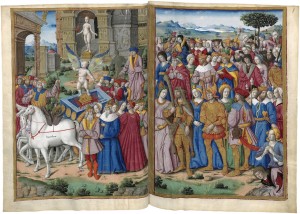It is wrongly supposed that the Dark Ages were a period of stunted growth for the arts and sciences, until civilization received another growth spurt starting the Renaissance, and came fully within the limelight during the Enlightenment. That some of our candidates’ candidly brusque remarks are often derogated as medieval is evidence that we may be holding a view about history not much less medieval. Parochial might serve better (since it was the church parishes who dominated at the time). In the west, history has not been so keen to recognize the virtues and advances made by Islamic civilization, as it has the rather slow progress (in some aspects) of Europe. Yet this still misses a larger point, which Sarah Pruitt at History valuably illuminates. Reason number one:
The idea of the Dark Ages came from later scholars who were heavily biased toward ancient Rome.
In the years following 476 A.D., various Germanic peoples conquered the former Roman Empire in the West (including Europe and North Africa), shoving aside ancient Roman traditions in favor of their own. The negative view of the so-called Dark Ages became popular largely because most of the written records of the time (including St. Jerome and St. Patrick in the fifth century, Gregory of Tours in the sixth and Bede in the eighth) had a strong Rome-centric bias.
While its true that such innovations as Roman concrete were lost, and the literacy rate was not as high in the Early Middle Ages as in ancient Rome, the idea of the so-called Dark Ages came from Renaissance scholars like Petrarch, who viewed ancient Greece and Rome as the pinnacle of human achievement. Accordingly, they dismissed the era that followed as a dark and chaotic time in which no great leaders emerged, no scientific accomplishments were made and no great art was produced.
In fact, as Pruitt mentions, the Dark Ages was a phrase coined by one of its greatest troubadours, Petrach. It was he and the other philhellenes at the time that held the limelight away from the achievements that we now regard as no less marvelous than those of antiquity. Just because human beings tend to have mid-life crises does not mean that civilizations must also, and Pruitt provides us with five more reasons for believing so.
Read her full post History

